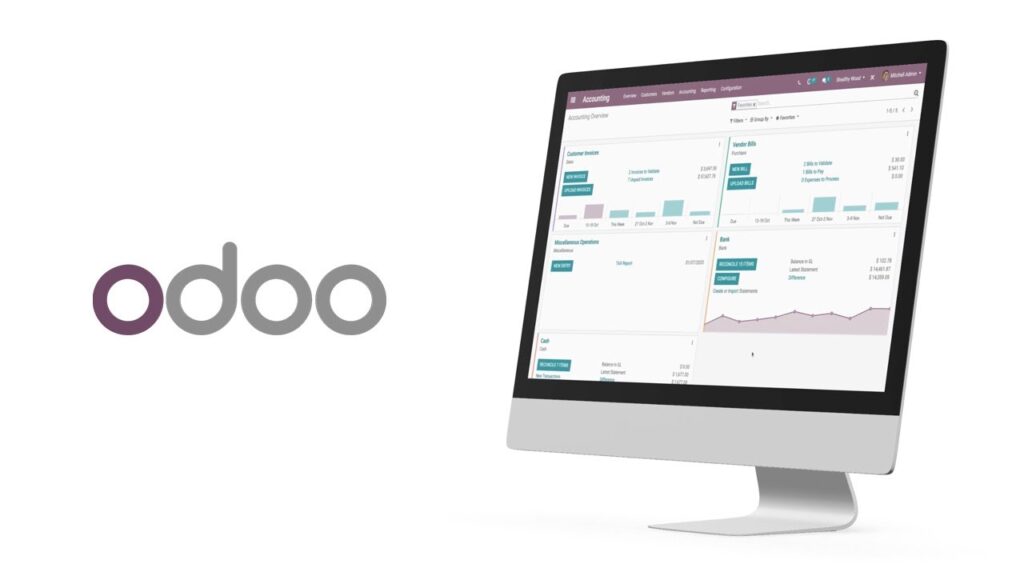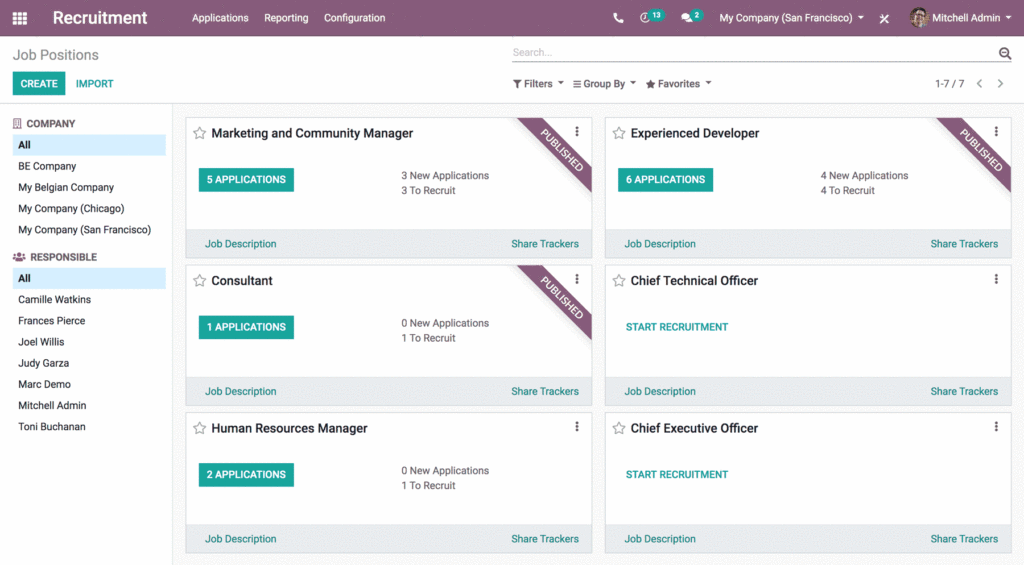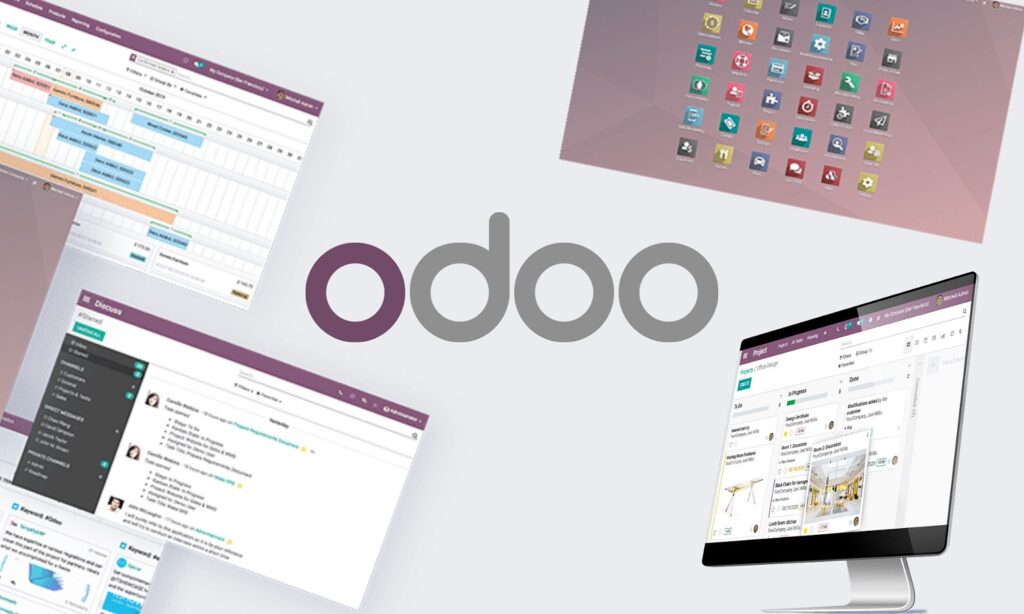The big question: Is Odoo a good ERP? We’ll share that and more, but let’s gather some facts! An enterprise resource planning (ERP) system is a software suite that integrates all the essential aspects of an organization’s business processes.
They include accounting, manufacturing, sales, and human resources. ERP systems are designed to streamline operations, improve efficiency, and make better decisions.
Odoo ERP is an open-source ERP system used by businesses of all sizes. It is known for its flexibility and scalability.
Also, it offers many features, including accounting, inventory management, Customer Relationship Management, and manufacturing.
Odoo is a cloud-based ERP system that streamlines operations, improves efficiency, and helps you make better decisions.
The importance of choosing the right ERP for your business:
- Streamlined operations:
ERP systems automate core business processes to improve efficiency and accuracy. The system centralizes business processes to eliminate siloed approaches and streamline operations.
- Improved decision-making:
ERP systems provide a unified view of business operations, enabling organizations to make more informed decisions.
Real-time data and analytics help businesses make better decisions by providing insights into their operations.
- Increased efficiency and productivity:
ERP systems eliminate redundancies and automate manual tasks, leading to improved accuracy and productivity
By integrating and synchronizing interconnected processes, departments can work together more effectively, achieving faster and better outcomes.
- Scalability and flexibility:
The right ERP system should scale with your business as it grows. It should offer flexibility in terms of customization and adaptability to changing business needs.
Ensures that your ERP system can support your business now and in the future.
- Data centralization and accessibility:
ERP systems act as a central hub for end-to-end workflow and data. They provide transparency across all departments by providing access to necessary production, logistics, and financial information.
It promotes collaboration and enables better communication across the organization.
- Cost savings:
While implementing an ERP system may require an initial investment, it can lead to long-term cost savings
By streamlining operations, reducing redundancies, and improving efficiency, businesses can save on labor costs, inventory management, and other operational expenses.
- Competitive advantage:
Choosing the right ERP system can give your business a competitive edge. Optimize processes, respond quickly, and stay ahead.
Additionally, having a modern and efficient ERP system can enhance your brand reputation and attract potential customers.
Is Odoo a good ERP for your business?
1. What are your business needs:
First and foremost, you need to assess your specific business requirements. What processes do you need the ERP system to streamline or manage?
Do you require finance, inventory, sales, HR, or other modules? Different ERP systems excel in various areas.
Understanding your needs will help determine if Odoo offers the necessary features that align with your operational demands.
2. Consider your budget:
ERP implementation can be a significant investment. You need to establish a clear budget for the software and implementation processes.
Odoo is known for its cost-effectiveness compared to other ERP solutions, but it’s still essential to align your budget with your business size and the required features.
Factor in initial costs, ongoing maintenance, support, and potential customization expenses.
3. How’s your technical expertise:
Implementing and managing an ERP system requires technical expertise. Evaluate whether your team has the necessary skills to handle Odoo’s setup, configuration, and maintenance.
Odoo does offer user-friendly interfaces, but depending on your customization needs, you might need developers or consultants.
If your team lacks the required knowledge, you’ll need to budget for external assistance, which can impact the overall cost.
4. Evaluate scalability:
As your business grows, your ERP system must be scalable to accommodate increased demands.
Odoo offers a modular structure that allows you to start with the necessary modules and expand as your requirements evolve.
Consider whether Odoo’s scalability aligns with your business’s long-term vision and growth trajectory.
5. Assess integration possibilities:
Modern businesses rely on multiple software tools for different functions. Assessing how well Odoo can integrate with your existing systems is vital.
Seamless integration reduces data silos and enhances efficiency across your organization. Odoo’s compatibility with various applications and APIs can play a significant role in streamlining your processes.
6. Research user experience:
The success of an ERP implementation depends on user adoption. A user-friendly interface can significantly impact how well your team utilizes the system.
Explore Odoo’s user interface, user guides, and training resources to gauge the ease of use. A system that’s intuitive and requires minimal training can save time and reduce resistance to change.
7. Consider community and support:
Odoo has an active user community and offers both community and enterprise editions. Consider whether you can rely on community resources for support or if you require the additional features and support provided by the enterprise edition.
Adequate support ensures that technical issues are addressed promptly, minimizing downtime and disruptions.
Potential challenges when implementing Odoo ERP:
- Change management: Implementing a new ERP system is a major change for any business, and getting buy-in from all stakeholders is important. Employees may resist change, so it is important to communicate the benefits of Odoo ERP and provide training and support.
- Data migration: Migrating data from your existing system to Odoo can be complex and time-consuming. It is important to have a plan for data migration and to test the data carefully to ensure it is migrated correctly.
- Customization: Odoo is a highly customizable ERP system, which can also be challenging. It is important to consider your business needs carefully and customize Odoo easily.
- Integrations: Odoo can be integrated with other systems but can also be challenging. It is important to consider your integration needs carefully and to choose integration partners that have experience with Odoo.
- Support: Odoo is an open-source ERP system, so many resources are available for support. However, it is important to have a plan for support in case you need help with implementation, customization, or troubleshooting.
- Cost: The cost of implementing Odoo ERP can vary depending on the size and complexity of your business. It is important to factor in the price of implementation, training, and support when deciding.
- Security: Odoo is a secure ERP system, but it is important to take steps to protect your data. It includes implementing security measures such as firewalls, intrusion detection systems, and access control.
Wrapping up: Is odoo a good ERP;
Determining if Odoo is the right ERP choice for your business involves a comprehensive evaluation of multiple factors.
Overall, Odoo is a good choice for businesses looking for an affordable, flexible, and scalable ERP system.
However, it is important to carefully consider your needs and requirements before deciding. It’s an investment in your business’s future.






